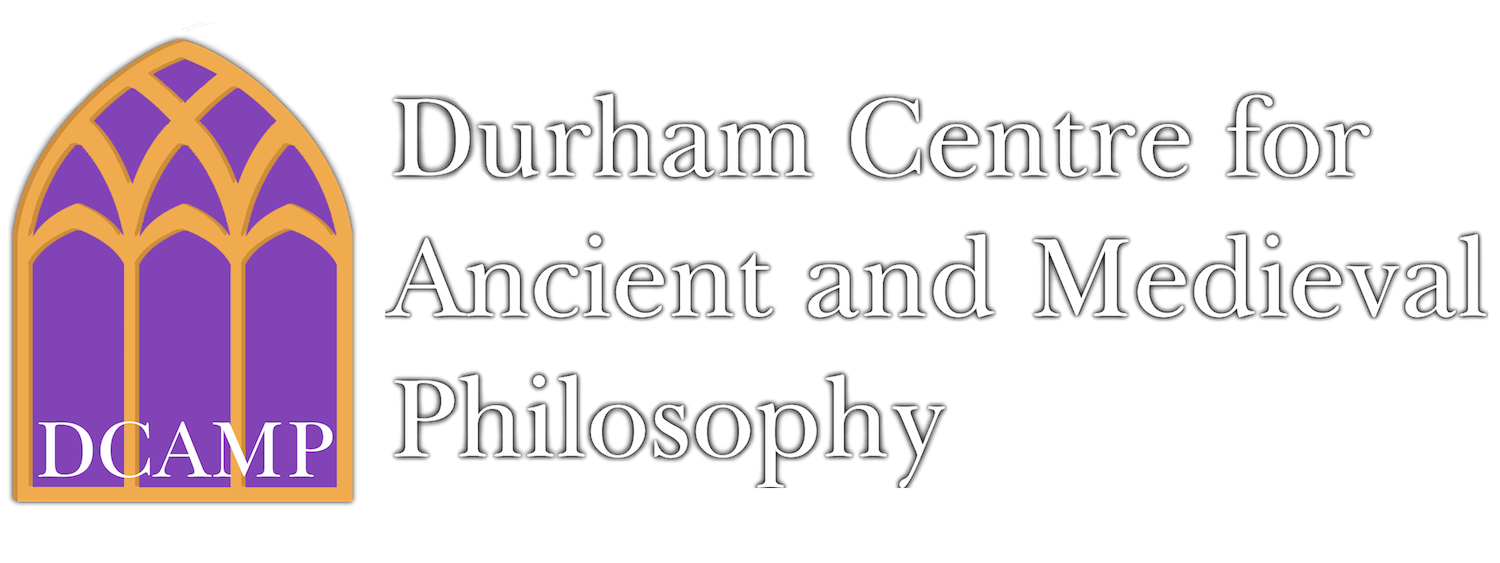DCAMP is very pleased to announce that we will be sponsoring not one, not two, not three, but FOUR sessions on medieval philosophy at the International Medieval Congress, Leeds, July 2019! Here are the details of the four sessions:
Session 1035: What Is the Matter of/with Medieval Philosophy?, I: The Matter of Logic
Wednesday July 3, 9-10:30.
This is the first of four panels on ‘What Is the
Matter of/with Medieval Philosophy?’, bringing
together papers addressing the subject matter of
medieval philosophy, including how subfields of
philosophy were demarcated; how philosophy was
separated from other disciplines; how medieval
philosophy is separated from (and continuous with!)
ancient and early modern philosophy. This panel on
the subject matter of logic brings together three
papers on medieval accounts of the subject matter
of logic; the use of the notion of ‘verificare’ in
medieval logic, semantics, and epistemology; and the
role of logic in theology and philosophy.
- Jacob Archambault, “Dialectically Situating Medieval Accounts of the Subject Matter of Logic”
- Anastasia Kopylova, “The Role of Verificatur in W. Ockham, J. Buridan, and W. Chatton’s Semantics”
- Claudia Appolloni, “Mundana and Sermocinali Philosophia in Peter John Olivi’s Writings”
Session 1135: What Is the Matter of/with Medieval Philosophy?, II: The Matter of Metaphysics
Wednesday July 3, 11:15-12:45.
This is the second of four panels on ‘What Is the
Matter of/with Medieval Philosophy?’, bringing
together papers addressing the subject matter of
medieval philosophy, including how subfields of
philosophy were demarcated; how philosophy was
separated from other disciplines; how medieval
philosophy is separated from (and continuous with)
ancient and early modern philosophy. This panel on
metaphysics brings together three papers on
Suarez and the real essence of objects; Suarez on
natural distinctions in metaphysical philosophy; and
the substance of artifacts in Aquinas.
- Stephen Boulter, “What Philosophers Used to Know about Distinctions”
- Jack Robert Coopey, “Francisco Suárez and Heidegger’s Modernity of Metaphysics: A Baroque Contribution to the Downfall of Scholastic Thought”
- Sean M. Costello, “Substantializing Aquinas’s Artifacts: A Path to
Substancehood for Chemically-Constituted Artifacts in
the Thought of Thomas Aquinas”
Session 1235: What Is the Matter of/with Medieval Philosophy?, III: The Matter of the Mind and Soul
Wednesday July 3, 14:15-15:45.
This is the third of four panels on ‘What Is the
Matter of/with Medieval Philosophy?’, bringing
together papers addressing the subject matter of
medieval philosophy, including how subfields of
philosophy were demarcated; how philosophy was
separated from other disciplines; how medieval
philosophy is separated from (and continuous with)
ancient and early modern philosophy. This panel on
philosophy of mind (including the soul) brings
together three papers on the nature of the soul
and its experience of pain; the role of reason in
personal responsibility; the faculties of the
soul.
- Elena Baltuta, “Ouch!: On Pain and Its Intentional Character in Robert Kilwardby”
- Jordan McFadden, “The Scope of Responsibility for Aquinas: Does Ought
Imply Can?” - Lydia Deni Gamboa López, “Ockham on the Acts and Faculties of the Sensitive Soul”
Session 1335: What Is the Matter of/with Medieval Philosophy?, IV:
The Reception, Transmission, and Teaching of Medieval
Philosophy
Wednesday July 3, 16:30-18:00.
This is the fourth and final panel in a series on
‘What Is the Matter of/with Medieval Philosophy?’,
bringing together papers addressing the subject
matter of medieval philosophy, including how
subfields of philosophy were demarcated; how
philosophy was separated from other disciplines; how
medieval philosophy is separated from (and continuous
with) ancient and early modern philosophy. This panel
focuses on what medieval philosophy is, what it
received from ancient philosophy and what it
transmitted to post-medieval philosophy, and what
role medieval philosophy has in the present day
classroom.
- Daniel Contreras: “Thomas Aquinas and John Duns Scotus on the Proper
Object of the Intellect and the Distinction between
Philosophy and Theology” - Tommaso Manzon, “The Serpent’s Body: St John Bonaventure and St
Gregory Palamas on Philosophy and Theology, with
Particular Rreference to On the Reduction of the
Arts to Theology and the First Triad” - Martin Lenz, “Predate the Scientific Revolution!: Highlighting
(Strategic) Continuities between Medieval and Modern
Philosophy”
